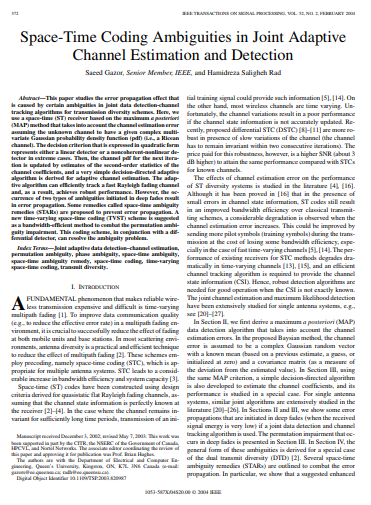Space-Time Coding Ambiguities in Joint Adaptive Channel Estimation and Detection
Abstract
This paper studies the error propagation effect that is caused by certain ambiguities in joint data detection-channel tracking algorithms for transmission diversity schemes. Here, we use a space-time (ST) receiver based on the maximum a posteriori (MAP) method that takes into account the channel estimation error assuming the unknown channel to have a given complex multivariate Gaussian probability density function (pdf) (i.e., a Ricean channel). The decision criterion that is expressed in quadratic form represents either a linear detector or a noncoherent nonlinear detector in extreme cases. Then, the channel pdf for the next iteration is updated by estimates of the second-order statistics of the channel coefficients, and a very simple decision-directed adaptive algorithm is derived for adaptive channel estimation. The adaptive algorithm can efficiently track a fast Rayleigh fading channel and, as a result, achieves robust performance. However, the occurrence of two types of ambiguities initiated in deep fades result in error propagation. Some remedies called space-time ambiguity remedies (STARs) are proposed to prevent error propagation. A new time-varying space-time coding (TVST) scheme is suggested as a bandwidth-efficient method to combat the permutation ambiguity impairment. This coding scheme, in conjunction with a differential detector, can resolve the ambiguity problem.

